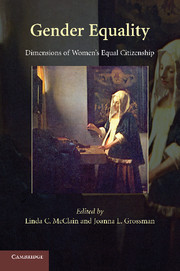Book contents
- Frontmatter
- Contents
- Contributors
- Acknowledgments
- Gender Equality
- Introduction
- PART I CONSTITUTIONAL CITIZENSHIP AND GENDER
- 1 Gender at the Margins of Contemporary Constitutional Citizenship
- 2 Becoming a Citizen: Marriage, Immigration, and Assimilation
- 3 Women's Civic Inclusion and the Bill of Rights
- 4 Must Feminists Identify as Secular Citizens? Lessons From Ontario
- 5 Feminist Fundamentalism and Constitutional Citizenship
- PART II POLITICAL CITIZENSHIP AND GENDER
- PART III SOCIAL CITIZENSHIP AND GENDER
- PART IV SEXUAL AND REPRODUCTIVE CITIZENSHIP
- PART V GLOBAL CITIZENSHIP AND GENDER
- Suggested Readings
- Index
- References
5 - Feminist Fundamentalism and Constitutional Citizenship
Published online by Cambridge University Press: 05 August 2012
- Frontmatter
- Contents
- Contributors
- Acknowledgments
- Gender Equality
- Introduction
- PART I CONSTITUTIONAL CITIZENSHIP AND GENDER
- 1 Gender at the Margins of Contemporary Constitutional Citizenship
- 2 Becoming a Citizen: Marriage, Immigration, and Assimilation
- 3 Women's Civic Inclusion and the Bill of Rights
- 4 Must Feminists Identify as Secular Citizens? Lessons From Ontario
- 5 Feminist Fundamentalism and Constitutional Citizenship
- PART II POLITICAL CITIZENSHIP AND GENDER
- PART III SOCIAL CITIZENSHIP AND GENDER
- PART IV SEXUAL AND REPRODUCTIVE CITIZENSHIP
- PART V GLOBAL CITIZENSHIP AND GENDER
- Suggested Readings
- Index
- References
Summary
At a time when so many different religious fundamentalisms are coming to the fore and demanding legal recognition, I want to vindicate something I have come to call feminist fundamentalism, by which I mean an uncompromising commitment to the equality of the sexes as intense and at least as worthy of respect as, for example, a religiously or culturally based commitment to female subordination or fixed sex roles. As I shall argue, both individuals and nation-states can have feminist fundamentalist commitments.
Fundamentalism and Perfectionism Defined
I define myself as a feminist fundamentalist. I am deeply and profoundly committed to the equality of the sexes and, in particular, to its instantiation in the repudiation of “fixed notions concerning the roles and abilities of males and females.” These commitments are at my fundament, my root, my base. My commitment to them is such that I would find it very difficult to act in ways contrary to or inconsistent with them, much like a believer who, even when the alternative is martyrdom, would refuse to deny the faith and sacrifice to what she believes are false idols, or, less dramatically, like a believer who would rather go hungry than eat forbidden food. A few examples may make this clear: first, recall that the Southern Baptists fairly recently declared that it was a wife's duty to “submit herself graciously to the servant leadership of her husband.
- Type
- Chapter
- Information
- Gender EqualityDimensions of Women's Equal Citizenship, pp. 107 - 128Publisher: Cambridge University PressPrint publication year: 2009



